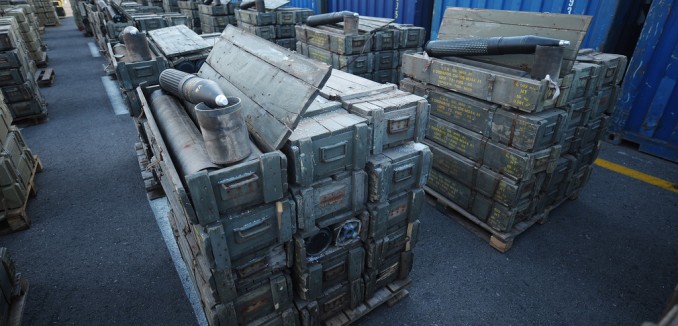The nuclear accords announced between the P5+1 powers and Iran include a provision that will lift the UN’s conventional arms embargo imposed on Iran after five years and restrictions on ballistic missile trade after eight years, The New York Times reported today. The restrictions may be removed within an even shorter time-frame if the International Atomic Energy Agency concludes that Iran is not violating the agreement or seeking weapons illicitly, and that its nuclear program is peaceful in nature.
The agreement states in article 4 of its preamble that it will “produce the comprehensive lifting of all UN Security Council sanctions […] related to Iran’s nuclear programme,” a measure which is detailed further in the document:
The UN Security Council resolution endorsing this JCPOA will terminate all provisions of previous UN Security Council resolutions on the Iranian nuclear issue – 1696 (2006), 1737 (2006), 1747 (2007), 1803 (2008), 1835 (2008), 1929 (2010) and 2224 (2015) – simultaneously with the IAEA-verified implementation of agreed nuclear-related measures by Iran and will establish specific restrictions, as specified in Annex V.
Resolution 1747 prohibits Iran from supplying, selling, or transferring arms and related material to member states, while resolution 1929 includes more items in the embargo. Iran has routinely violated both resolutions, with a UNSC Sanctions Committee effectively confirming last year that Tehran was behind an intercepted shipment of 40 rockets, 181 mortar shells, and 400,000 rounds of ammunition to the Gaza-based terrorist group Hamas.
In 2013, the State Department Report on Terrorism identified Iran as an arms supplier to Hamas and other Palestinian terrorist groups, as well as the regime of Syrian president Bashar al-Assad, to which Iran recently opened a $1 billion credit line. The State Department continues to designate Iran as a “State Sponsor of Terrorism,” something it has done every year since 1984, noting that “Iran publicly admits to sending members of the [Islamic Revolutionary Guard Corps] to Syria in an advisory role.” This year’s report also accused Iran of harboring senior members of al-Qaeda and of being a “proliferation concern” due to its “noncompliance with its international obligations regarding its nuclear program.”
Iran also continues to supply the terrorist group Hezbollah with funds and weapons, in violation of UNSC resolution 1701, which forbids the transfer of arms to any non-governmental entity in Lebanon. Tehran further extends support to other militant groups across the region, including the Houthi rebels in Yemen and Shiite militias in Iraq.
Last week, Gen. Martin Dempsey, chairman of the Joint Chiefs of Staff, warned that “under no circumstances should we relieve pressure on Iran relative to ballistic missile capabilities and arms trafficking,” while Andrew Bowen, a senior fellow at the Center for the National Interest, wrote yesterday that lifting the embargo “could endanger U.S. personnel at regional diplomatic and military facilities.” Sen. Bob Menendez (D – N.J.) also shared his concern today about Iran’s ability to produce intercontinental ballistic missiles, saying he was amazed that “we included the arms embargo and the missile technology question as part of this deal.” Menendez warned that Iran made such demands in order “to continue to deploy its terrorism throughout the region as it is presently doing, even in desperate economic straits.”
A Pentagon report released last month affirmed that Iran is continuing to develop its ballistic missile technology in violation of multiple UNSC resolutions. Since the beginning of the nuclear negotiations, Iran has insisted on keeping its ballistic missile program off the table. The Tower reported in February 2014:
The position has become a familiar one, with Iranian officials repeatedly emphasizing in recent weeks that issues related to ballistic missiles would be off-limits to negotiators. White House officials, in contrast, have explicitly assured U.S. lawmakers that Iran will be expected to address its ballistic missile program, after those lawmakers expressed concerns that American negotiators had been outmaneuvered in setting the terms for the interim Joint Plan of Action (JPA).
Iran’s ballistic missile program has gone from being illicit, to not being subject to negotiations, to being legalized by the recent agreement.
[Photo: Israel Defense Forces / Flickr]




